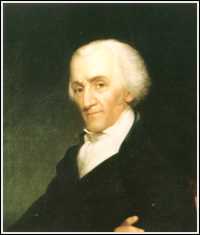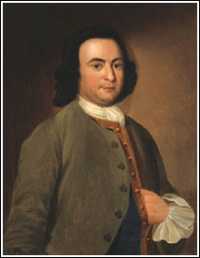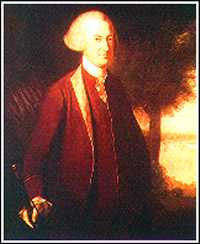Electing Representatives (June 6)
- MR. GERRY.
 Much depends on the mode of election. In England, the people
will probably lose their liberty from the smallness of the proportion having a right of suffrage. Our danger
arises from the opposite extreme; hence in Massachusetts the worst men get into the Legislature. Several members of that
Body had lately been convicted of infamous crimes. Men of indigcnce, ignorance and baseness, spare no pains, however
dirty to carry their point against men who are superior to the artifices practised. He was not disposed to run into extremes. He
Was as much principled as ever against aristocacy and monarchy. It was neccesary on the one hand that the people should
appoint one branch of the govermnent in order to inspire them
with the necessAry confidence. But he wished the election on the
other to be so modified as to secure more effectually a just
preference of merit. His idea was that the people should nominate certain persons in certain districts, out of whom the State
legisilatures should make the appointment.
Much depends on the mode of election. In England, the people
will probably lose their liberty from the smallness of the proportion having a right of suffrage. Our danger
arises from the opposite extreme; hence in Massachusetts the worst men get into the Legislature. Several members of that
Body had lately been convicted of infamous crimes. Men of indigcnce, ignorance and baseness, spare no pains, however
dirty to carry their point against men who are superior to the artifices practised. He was not disposed to run into extremes. He
Was as much principled as ever against aristocacy and monarchy. It was neccesary on the one hand that the people should
appoint one branch of the govermnent in order to inspire them
with the necessAry confidence. But he wished the election on the
other to be so modified as to secure more effectually a just
preference of merit. His idea was that the people should nominate certain persons in certain districts, out of whom the State
legisilatures should make the appointment.- MR. WILSON
- He wished for vigor in the government but he
wished that vigorons authority to flow immediately fiom the
legitimate source of all authority. The government ought to
possess not only first the force, but secondly the mind or sense
of the people at large. The LegisIature ought to be the most exact
transcript of the whole Society. Representation is made
necessary only because it is impossible for the people to act
collectively. The opposition was to be expected he said from the
Governments, not from the Citizens of the States. The latter had
parted as was observed (by Mr. King) with all the necessary
powers, and it was immaterial to them, by whom they were
exercised, if well exercised. The State officers were to be the
losers of power. The people he supposed would he rather more
attached to the national Government than to the State governments as being more important in itself, and more flattering to
their pride. There is no danger of improper elections if made by
large districts. Bad elections proceed from the smallness of the
districts which give an opportunity to bad men to intrigue themselves into office.
- MR. SHERMAN.
- If it were in view to abolish the State governrnents, the elections ought to be by the people. If the State
governments are to be continued, it is necessary in order to
preserve haomony between the National and State governments
that the elections to the former should he made by the latter. The
right of participating in the National Government would he
sufficiently secured to the people by their election of the State
Legislatures. The objects of the Union, he thought were few.
- l. Defence against foreign danger.
- 2 against internal disputes and a resort to Iorce.
- 3. Treaties with foreign nations.
- 4. Regulating foreign commerce, and drawing revenue from it.
These and perhaps a few lesser objects alone rendered a Confederation of the States necessary. All other matters civil and criminal would be much better in the hands of the States. The people are more happy in small than large States. States may indeed he too small as Rhode Island, and thereby be too subject to faction. Some others were perhaps too large, the powers of government not heing able to pervade them. He was for giving the General government power to legislate and execute within a defined province.
- COLONEL MASON
 Under the existing Confederacy, congress
represents the States not the people of the States: their acts
operate on the States, not on the individuals. The case will be
changed in the new plan of government. The people will be
represented; they ought therefore to choose the Representatives.
The requisites in actual representation are that the
Representatives should sympathize with their constituents; should think as
they think, and feel as they feel; and that for these purposes
should even be residents among them. Much he said had been
alleged against democratic elections. He admitted that much might
be said; but it was to be considered that no Government was free
from imperfections and evils; and that improper elections in
many instances, were inseparable from Republican Governments.
But compare these with the advantage of this Form in favor of
the rights of the people, in favor of human nature. He was
persuaded there was a better chance for proper elections by the
people, if divided into large districts, than by the State Legislatures. Paper money had been issued by the latter when the former
Were against it. Was it to be supposed that the State Legislatures
then would not send to the National Legislature patrons of such
projects if the choice depended on them.
Under the existing Confederacy, congress
represents the States not the people of the States: their acts
operate on the States, not on the individuals. The case will be
changed in the new plan of government. The people will be
represented; they ought therefore to choose the Representatives.
The requisites in actual representation are that the
Representatives should sympathize with their constituents; should think as
they think, and feel as they feel; and that for these purposes
should even be residents among them. Much he said had been
alleged against democratic elections. He admitted that much might
be said; but it was to be considered that no Government was free
from imperfections and evils; and that improper elections in
many instances, were inseparable from Republican Governments.
But compare these with the advantage of this Form in favor of
the rights of the people, in favor of human nature. He was
persuaded there was a better chance for proper elections by the
people, if divided into large districts, than by the State Legislatures. Paper money had been issued by the latter when the former
Were against it. Was it to be supposed that the State Legislatures
then would not send to the National Legislature patrons of such
projects if the choice depended on them.- MR. MADISON
- considered an election of one branch at least of
the Legislaure by the people immediately, as a clear principle of
free government and that this mode under proper regulations had
the additional advantage of securing better representatives, as
well as of avoiding too great an agency of the State Governments
in the General one.He differed from the member from
Connecticut [Mr. Sherman] in thinking the objects mentioned to be
all the principal ones that required a National government.
Those were certainly important and necessary obiects; but he
combined with them the necessity of providing more effectually
for the eecurity of private rights, and the steady dispensation of
Justice. Interference: With these were evils which had more
perhaps than any thing else, produced this convention. Was it to
be supposed that republican liberty could long exist under the
abuses of it practised in some of the States. The gentleman (Mr.
Sherman] had admitted that in a very small State, faction and
oppression would prevail. It was to be inferred then that wherever these prevailed the State was too small. Had they not
prevailed in the largest as well as the smallest though less than in
the smallest; and were we not thence admonished to enlarge the
sphere as far as the nature of the govcrnment would admit. This
was the only defence against the inconveniences of democracy
consistent with the democratic form of government. All civilized
Societes would be divided into different Sects, Factions, and
interests, as they happened to consist of rich and poor, debtors
and creditors, the landed, the manufacturing, the commercia1
interests, the inhabitants of this district or that district, the followers of this political leader or that political leader, the
disciples of this religious Sect or that religious Sect. In all cases
where a majority are united by a common interest or passion, the
rights of the minority are in danger. What motives are to restrain
them? A prudent regard to the maxim that honesty is the best
policy is found by experience to be as little regarded by bodies of
men as by individnals. Respect for character is always diminished in proportion to the number among whom the blame or
praise is to be divided. Conscience, the only remaining tie, is
known to he inadequate in individuals: In large numbers, little is
to be expected from it. Besides, Religion itself may become a
motive to persecution and oppression.These observations are
verified by the Histories of every Country ancient and modern.
In Greece and Rome the rich and poor, the creditors and debtors,
as well as the patricians and plebeians alternately oppressed each
other with eqnal unmercifu1ness. What a source of oppression
was the relation between the parent cities of Rome, Athens and
Carthage, and their respective provinces: the former possessing
the power, and the latter being sufficiently distinguished to be
separate objects of it? Why was America so justly apprehensive
of Parliamentary injustice? Because Great Britain had a separate
interest real or supposed, and if her authority had been admitted,
could have pursued that interest at our expense. We have seen
the mere distinction of colour made in the most enlightened
period of time, a ground of the most oppressive dominion ever
exercised by man over man. What has been the source of those
unjust laws complained of among ourselves? Has it not been the
real or supposed interest of the major number? Debtors have
defrauded their creditors. The landed interest has borne hard on
the mercantile interest The Holders of one species of property
have thrown a disproportion of taxes on the holders of another
species. The lesson We are to draw from the whole is that where
a majority are united by a common sentiment, and have an
opportunity, the rights of the minor party become insecure. In a
republican government the Majority if united have always an
opportunity. The only remedy is to enlarge the sphere, and
thereby divide the community into so great a number of interests
and parties, that in the first place a majority will not be likely at
the same moment to have a common interest separate from that
of the whole or of the minority; and in the second place, that in
case they should have such an imerest, they may not be apt to
unite in the pursuit of it. It was incumbent on us then to try this
remedy, and with that view to frame a republican system on such
a scale and in such a form as will control all the evils which have
been experienced.
- MR. DICKINSON
 considered it as essential that one branch of the
Legislature should be drawn immediately from the people;
and as expedient that the other should be chosen by the Legislatures of the States. This combination of the State governments
with the national government was as politic as it was unavoidable.
In the formation of the Senate we ought to carry it through such
a refining process as will assimilate it as near as may be to the
House of Lords in England. He repeated his warm eulogiums on
the British Constitution. He was for a strong National government but for leaving the States a considerable agency in the
System. The objection against making the former dependent on
the Iater might be obviated by giving to the Senate an authority
permanent and irrevocable for three, five or seven years. Being
thus independent they will speak and decide with becoming
freedom.
considered it as essential that one branch of the
Legislature should be drawn immediately from the people;
and as expedient that the other should be chosen by the Legislatures of the States. This combination of the State governments
with the national government was as politic as it was unavoidable.
In the formation of the Senate we ought to carry it through such
a refining process as will assimilate it as near as may be to the
House of Lords in England. He repeated his warm eulogiums on
the British Constitution. He was for a strong National government but for leaving the States a considerable agency in the
System. The objection against making the former dependent on
the Iater might be obviated by giving to the Senate an authority
permanent and irrevocable for three, five or seven years. Being
thus independent they will speak and decide with becoming
freedom.- MR. READ,
- Too much attachment is betrayed to the State
government:. We must look beyond their continuance. A national government must soon of necessity swallow all of them
up. They wlll soon be reduced to the mere office of electing the
National senate. He was against patching up the old federal
system: he hoped the idea would be dismissed. It would be like
putting new cloth on an old garment. The confederation was
found on temporary principles. It cannot last: it cannot be
amended. If we do not establish a good government on new
prineiples, we must either go to ruin, or have the work to do
over again. The people at large are wrongly suspected of being
averse to a general government. The aversion lies among interested men Who posess their confidence.
- MR. PIERCE
- was for an election by the people as to the first
branch and by the States as to the second branch; by which
means the Citizens of the States would be represened both
individually and collectively.
